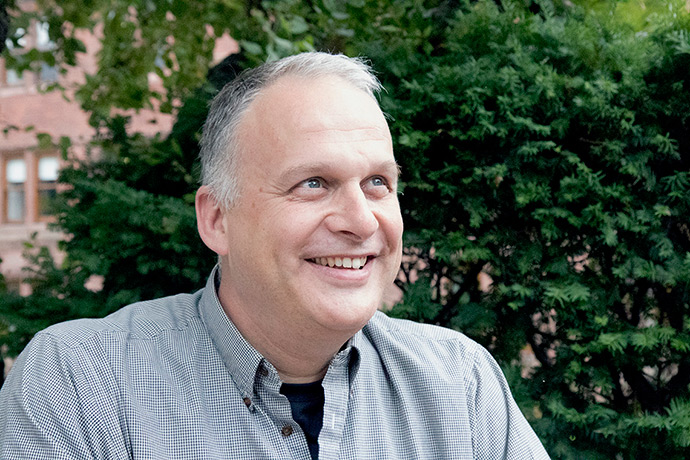
From The Bulletin Brief
Markus Dubber, a scholar and professor of law and ethics, might surprise you when he tells you about what motivates him to create learning opportunities for students outside the classroom. “I want them to not hate school as much as I sometimes did,” he says with a laugh.
It’s a relatable response for anyone who has spent hours studying alone – even on topics that they love.
“When I was at Stanford, there was a lot going on, but most of it wasn’t in class,” he says. “People were meeting and talking and debating outside of class, and that was also a great education.”
A Harvard- and Stanford-educated lawyer and professor at the Faculty of Law, Dubber is also the director of the bustling Centre for Ethics. He knows instinctively that the education you get in a classroom will shape the foundation of a student’s future, but the learning that happens outside the classroom is equally valuable.
Dubber grew up in Germany and first came to North America as an exchange student in a high school in Georgia. He says he liked studying in the U.S. and decided to come back to work on his bachelor’s degree at Harvard University, and then to pursue a J.D. at Stanford University.
“American universities saw the rise of critical legal studies in the late eighties, and a lot of interesting things were happening at the time,” he says. “Changes and criticism in how the legal profession was practised.”
That meant engaging in vibrant debates on campus and beyond – debates that inspired Dubber to make space for those conversations at U of T – for students, staff, faculty and community members to learn from each other. The aim is to explore pressing issues of law and ethics, served with a dose of fun.
Take for instance the Critical Analysis of Law (CAL) journal, which Dubber first started with colleagues and his students as a "read-in" group in 2012. The project grew to a journal now in its fifth year and with over 40,000 article views. “We started a reading group, which met in the faculty lounge,” he says. “We read formative texts and literature like Karl Llewellyn’s The Bramble Bush, and critical race theory and feminism.”
The CAL reading group was created so that students could bounce ideas around, and explore legal questions without an exam at the end of the process, wrote Sarah Rankin, a student and co-organizer, in a 2012 article in Ultra Vires, a student newspaper at the Faculty of Law.
Rankin, who went on to play a leading role in the launch of the journal and graduated from the Faculty of Law as the valedictorian of her class, said in the article that the initiative emphasized informality, curiosity – and cookies.
“We have this amazing list of contributors: historians, philosophers, experts from different fields from North America and all over the world. It’s become a really successful legal academic journal,” says Dubber. “And the students are still working on it.
“We also organized an online book club where we read David Foster Wallace’s Infinite Jest.”
The reading group, started in 2013, was led by Dubber, Rankin and former student James Marton, as well as Mayo Moran, former Faculty of Law dean and current provost and vice-chancellor of Trinity College.
Dubber continues to foster scholarly curiosity and community through the Centre for Ethics – a busy hub with a wide range of events and initiatives throughout the year. For example, it held a panel discussion that explored the ethical dimensions of Leonard Cohen, in which one of the panelists was former parliamentary poet laureate and U of T Professor George Elliott Clarke.
It also holds the Author Meets Critic series where experts and attendees examine books on various topics of ethics. Film lovers, meanwhile, have the opportunity to view and discuss films such as Tangerine, Blade Runner, Star Trek, Moonlight and many others.
Ethics and cities are examined through events, articles and courses, as are the implications of artificial intelligence. (Dubber is the ethicist at the Creative Destruction Lab at the Rotman School of Management.) And there’s much more going on – all aimed to engage students and the community at large in timely issues, and to apply learning to real-world problems.
“The idea is for school to not be so hierarchical,” says Dubber. “I want to make it challenging and interesting for students so that they want to participate, as opposed to forcing them to learn. That’s what would have made me want to go to class.”

